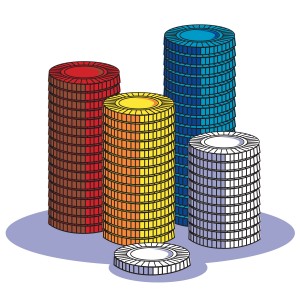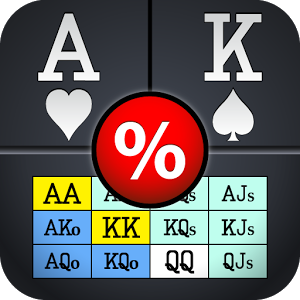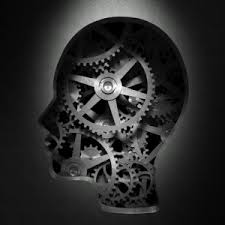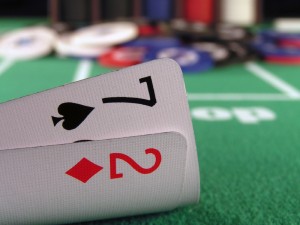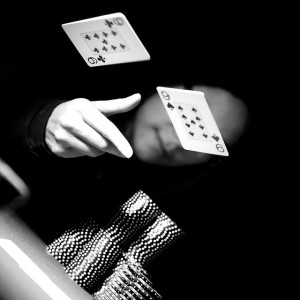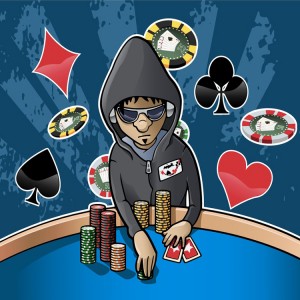In most things in life, there is little danger in being optimistic. In fact studies have shown that optimists tend to be happier and more successful than pessimists. Approaching most things in life thinking you will be successful leads to a greater chance you will be successful for psychological reasons beyond the scope of this article. In poker too being an optimist can sometimes be a good thing. Certainly it is a bad idea sitting down to play poker thinking you are going to lose.
However, it is important to differentiate the things that it doesn’t pay to be optimistic about. Cards don’t give a damn about your frame of mind. Probabilities don’t change because you are in a good mood. If you are optimistic about events that have a fixed probability and change your actions accordingly then you are playing sub-optimally. This article will explore the areas in poker in which optimism can hurt you, and maybe a good old-fashioned dose of pessimism would be better.
Your Opponent’s Hand
In Hold’em, the great unknown is the cards your opponents hold. Through their betting patterns you try to determine their most likely holdings, which along with your own cards allows you to determine your best course of action. If you allow your calculations to be influenced by optimism, then your read and your resulting decisions will also be bad. The most common manifestation of this is the calling station syndrome, where despite increasingly mounting evidence to the contrary, you are clinging onto the hope that your hand might be good. Consider the following hand:
You are in the big blind. A middle position player raises, the button calls, and you make a slightly loose call with Tc8c. The button you know is a loose player, and MP is new to the table and you have no read on him.
The flop comes Td 9s 3d
You check and MP bets, the button calls, you check-raise, MP 3-bets. You decide that there is a good chance he has AK and he is trying to bully you off your hand. Or he may just be a maniac, you don’t have any hands on him to tell. The button then calls two cold, and you figure he may well be on a flush draw. You call.
Turn (Td 9s 3d) Kh
You check and MP bets out. While you put him on AK, you figure he could just as easily have AQ or even AJ and is trying to buy the pot. The button calls and you still put him on a flush draw. You call.
River (Td 9s 3d Kh) 7d
MP bets out again and the button now raises. You figure there is a small chance you have the best hand, because your opponents may have…. what exactly? MP has shown strength all through the hand and there is every indication that the button has hit his draw. You somehow manufacture a call on the basis that MP may be overplaying something like A9, the button might be making a crazy raise on a busted hand, and you are getting decent pot odds. MP calls and turns over AT, the button turns over Jh8h.
Optimism got you into trouble in this hand from the start. When the flop came you automatically put the aggressor on one of the hands you could beat instead of one of the many you couldn’t. Then you changed your read when the hand you put him on now beat you. Then you changed your read on the other player when it is obvious he had hit a hand. You subconsciously allowed what you hoped your opponents held to proxy for what logic should indicate they might hold.
A similar but opposite example of misplaced optimism can be seen when the player in question is the aggressor. For example, a player with top pair will keep betting into an opponent who they figure must have middle pair and yet when the middle card pairs, they carry on betting, presumably changing their read because it was easier than accepting they had probably been outdrawn. The consistent trait of the optimist is that they will always put an opponent on a worse hand than is statistically likely, even if that means changing their read.
Number of Outs
Counting outs is another area where players are often overly optimistic. On the flop, it is often tempting to consider every hand that gives you top pair or better an out, and sometimes even more than that if the board is non-threatening. Take the following example.
You are UTG+2 and you have Kd Qd. UTG calls, you raise, the cutoff re-raises, the BB, UTG and you all call.
Flop comes Js 9d 5s
How many out do you give yourself here? An optimist might say they have four outs to the straight, six to top pair and a backdoor flush draw so that’s about 12. However, optimism is not good when looking at outs. How should you really count them?
Well you have 3 outs to the nuts (Td, Th, Tc). The Ts is tainted as it could give someone a flush. Even if it doesn’t, it could be dangerous as it leaves you with the possibility of a fourth spade on the river killing you. You also have 6 outs to top pair, but how good are these exactly? These outs could give someone else an even better hand if any of your opponents hold AK, AQ, KJ, K9, K5, QJ, Q9, Q5, QT or KT. Plus there is always the possibility that the cutoff (who re-raised pre-flop remember) may hold AA, KK or QQ or that someone has already made a set. Even if you make top pair and it is good, you will be dodging a huge amount of bullets on the river. All in all, your two over-cards are almost worthless. You also have a backdoor flush draw. This is probably worth about 1.5 outs max. So overall I would say you have:
3 outs to the straight after discounts for redraws, the tainted Ts and possibility of a split pot.
1.5 outs to overcards and this is being generous and including oddities like runner-runner Q’s
1.5 outs to backdoor flush.
Total = 6 outs, which is half of what the optimistic estimate was, and must be played very differently. One of the reasons there are so many calling stations out there is misplaced optimism. People like to think that they can improve their hand to win the pot when the reality is that all too often they will improve their hand and still lose the pot costing themselves many bets along the way.
Other Pitfalls of Optimism
Of course these aren’t the only two areas where optimism can hurt you. An optimist may also make the following mistakes.
-
Assuming bad downswings ‘won’t happen to them’
-
Thinking they can sustain an unsustainable win-rate obtained in the short term.
-
Assuming that they can beat the higher limits as easily as the lower limits
-
Thinking they can play bad hands and compensate with ‘good post-flop play’.
-
Assuming their opponents are bad players until proven otherwise.
Basically any situation where an optimist will choose a suboptimal strategy based on an assumption of a higher than average outcome will cause them to lose money in the long run.
Many people at this point are probably wondering what my views are on pessimism. Surely in a game like poker, optimism and pessimism are two sides of the same coin. If illogical optimism is bad, then surely illogical pessimism must be also. This is certainly true to an extent. A pessimist may make a number of very costly mistakes such as folding on the river in big pots assuming they are beaten, and not raising for value. However, in my opinion three factors combine to make optimism more dangerous than pessimism for the poker player.
-
Poker is a game more likely to be played by people who are generally optimistic. A pessimist would be less likely to take up a game like poker, and would quit sooner after experiencing losses.
-
Poker is structured to give the illusion of optimism being rewarded. The best result you can get from folding is not losing any more money, while speculation can yield the reward of winning the pot. Poker players, especially beginners, often have trouble equating money saved to money earned and so are more likely to make a bad call than a bad fold.
-
A pessimist is unlikely to lose a large amount of money due to pessimism. They may lose the occasional pot they shouldn’t, but an optimist may be making loose calls nearly every time they are in a pot. Plus they will make the occasional huge clanger like playing above their bankroll.
If you are one of nature optimists, make sure you don’t bring this attitude to the table with you. When you are playing, make sure you are playing not with hope but with reason. Think ‘what is likely’ rather than ‘what is possible in a best case scenario’.
Submit your review | |

